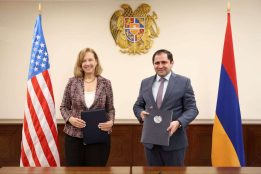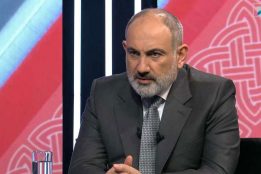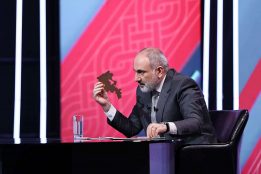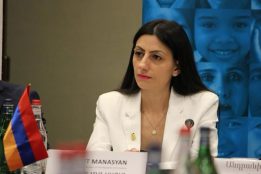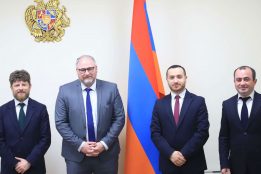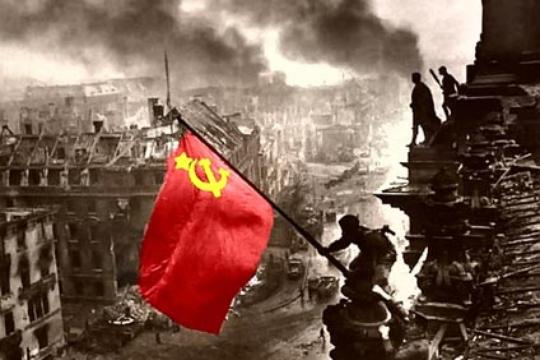
Vasili Rukhadze from the Jamestown Foundation touched upon the legacy of Soviet history in post-Soviet countries and its modern-day treatment. Find the article below.
On November 12, Georgia’s Deputy Minister of Culture Yuri Metchitov, serving in the “Georgian Dream”–led new government, declared that Georgia should change the name of the Museum of the Soviet Occupation, opened in Tbilisi in 2006. As Metchitov stated, the museum draws the irritation of Moscow, and in light of the new government’s efforts of rapprochement with Russia the cause of such irritation should be removed (www.netgazeti.ge, November 12). Metchitov’s comments and preceding events involving the museum renewed a temporarily latent battle over the interpretation of Soviet history in the South Caucasus republic. The battle is still ongoing in Georgia as well as beyond, in the other former Soviet republics.
The Museum of the Soviet Occupation was established to commemorate an estimated 880,000 Georgians who were killed or exiled under the Soviet occupation of Georgia in 1921–1991. The opening of the museum drew Moscow’s and President Vladimir Putin’s personal displeasure (www.regnum.ru, June 14, 2006).
To study and memorialize Russia’s occupation of Georgia, the Georgian government also established the State Commission for Finding Historical Truth (Truth Commission) in April 2010. It was tasked with conducting extensive research and provided a report on the Tsarist and Soviet occupation of Georgia in 1801–1991 (Adjara TV, April 10, 2010). The commission submitted a completed report to the government in December 2010.
Minister Metchitov’s statement, however, follows a string of recent controversy surrounding the museum in particular. On October 26, the Moscow-based, pro-Kremlin organization “Union of Russian and Georgian Peoples,” in a letter, addressed the head of the Georgian Orthodox Church Ilia II and the Minister of Culture Guram Odisharia offering to help mediate (possibly with the Georgian government) the closure of museums of Soviet and Russian occupation in Georgia, which were opened after the 2003 Rose Revolution (www.medianews.ge, October 26).
The idea found few supporters in Tbilisi. But the pro-Russian group “The Society of Erekle II,” supported by a small pro-Moscow political party The Council of Georgia’s Workers (CGW), staged a small rally on November 12 in front of the Soviet Occupation museum, demanding that officials rename it the Museum of Soviet Achievements in Georgia, removing the word “occupation.” Demonstrators vehemently denied that human atrocities ever occurred under Soviet rule (www.netgazeti.ge, November 12).
Three days later, on November 15, the organization “The House of Tolerance” arranged a counter rally in front of the museum, protesting its possible closure. Deputy Minister of Culture Alexander Margishvili met with the protesters and assured them that the closure of the museum was not being considered by the authorities (www.geo.palitratv.ge, November 15). So far, Georgia’s new Prime Minister Bidzina Ivanishvili has neither openly supported nor rejected the proposal for the renaming or the closure of the museum. Therefore, the issue remains unresolved.
In another related case, 1,200 inhabitants of Soviet dictator Joseph Stalin’s Georgian hometown of Gori demanded his monument be restored in the city center (www.vestnikkavkaza.net, October 26). The six-meter bronze statue was removed by the authorities in 2010 and relocated to the Museum of Stalin (www.civil.ge, June 25, 2010). Culture Minister Odisharia said that the authorities could consider the Gori residents’ request (www.interpressnews.ge, November 15).
These two cases appear to indicate that the debate over the interpretation of Soviet history in Georgia may be reignited; or perhaps, Soviet history may even be reframed under a less negative light by the new government. Furthermore, these events in Georgia arguably point to an emerging trend throughout the post-Soviet space—a replacement of previous governments, with declared pro-Western foreign policy orientations, with new governments that seek closer ties with Russia or are even considered pro-Russian, which immediately spark a renewal of the debate over interpretations of Soviet history.
An illustrative earlier example in the region was the recent shift in Ukraine of government policy and discourse surrounding the Holodomor. The Ukrainian Holodomor, which most historians argue was a man-made famine triggered by the Soviet government under Joseph Stalin in 1932–1933, according to some estimates claimed the lives of 3 million to 10 million Ukrainians, although numbers vary dramatically among often contradictory sources.
Ever since, the Holodomor has been the cause of debate and bitter controversy in Ukraine, Russia and beyond. Russia held that the famine was not limited to Ukraine and occurred in other Soviet republics as well, taking the lives of millions of non-Ukrainian Soviet citizens. Pro-Western President Viktor Yushchenko (2005–2010), who came to power as a result of the 2004 Orange Revolution, has been outspoken in memorializing the Holodomor and pushing for its international recognition as a “genocide” against Ukrainian people. This policy enraged Moscow and irritated pro-Russian regions in eastern Ukraine. In 2006, Ukraine’s parliament (Verkhovna Rada) even adopted a law that officially defined the Holodomor to have been “genocide” and made it an offense to declare otherwise (www.regnum.ru, November 28, 2006).
Ukraine’s more pro-Russian President Viktor Yanukovych has reversed the policy. Hours after his presidential inauguration on February 26, 2010, the section on the Holodomor on the presidential website was removed. In April 2010, President Yanukovych in his address to the Parliamentary Assembly of the Council of Europe declared that it would be “incorrect and unjust to consider the Holodomor a fact of genocide of a certain people” (www.kyivpost.com, November 2, 2010). This statement outraged the opposition, which accused him of breaking the law on the denial of “genocide” (RIA Novosti, April 27, 2010). Following the public protests, Yanukovych commemorated Holodomor Remembrance Day in November 2010 in a special ceremony separate from public events (www.zik.ua, November 17, 2011). Overall, Yanukovich’s administration has either kept its involvement in Holodomor-related policies and events quite low key, or entirely withdrew from it and in some cases even opposed it. However, controversy over the Holodomor and Soviet history in Ukraine continues. Examples of similar controversies are numerous in other former Soviet republics as well.
Recent events in Georgia and the discussed example of Ukraine illustrate that the debate over the interpretation of Soviet history is far from over in Georgia, Ukraine or elsewhere in the republics of the former Soviet Union. At this point, Georgian authorities, specifically from the ministry of culture, state that the Museum of the Soviet Occupation will not be closed. However, this does not ultimately mean that it will not be renamed at some point. Whatever the short-term outcome, in the long run, the new government and its attempts to rename the Soviet Occupation museum may reactivate a wider national and emotional debate over the interpretation of Soviet history in Georgia

















